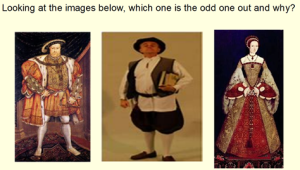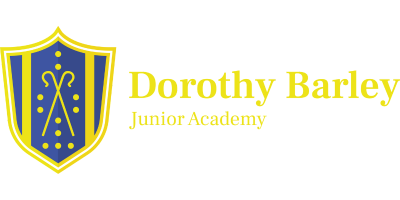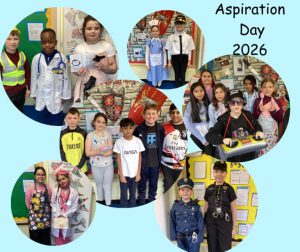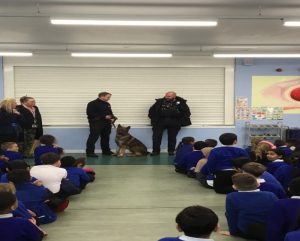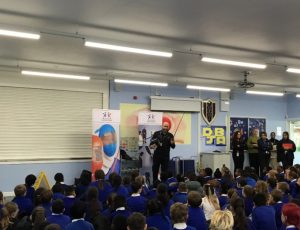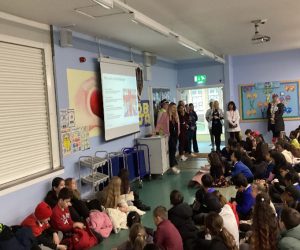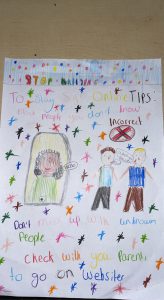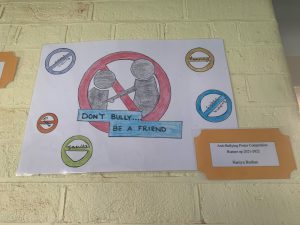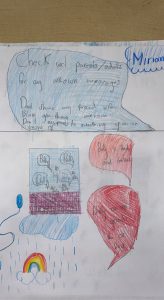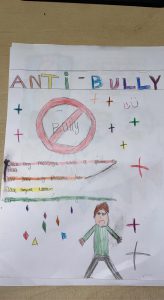The national guidance for PSHE and RSE education is being updated. Please see key changes coming in from September 2026. More detailed information to follow from senior leaders.
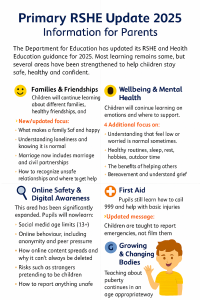
Personal development is at the heart of everything we do at DBJA, and opportunities to grow personally as well as academically are woven into our curriculum approaches. We consider the skills children need to be successful to be as important as their academic learning. We hope you will all agree that it has never been more important to invest in our children’s essential skills such as teamwork and problem solving, alongside their academic learning.
With that in mind, we submitted a bid for a fully funded programme to help us to develop this last year, and we were successful!
There were just 200 fully funded places on Accelerator 2025-26, available to state-maintained UK schools and colleges, and some independent specialist schools, so to have been given this opportunity is quite something.
Skills Builder Accelerator is a flagship programme for primaries, secondary schools, specialist settings and colleges which aims to develop a complete approach for building essential skills.
The Framework
If we want to successfully teach essential skills, we need to be consistent, explicit and specific. We often talk about how children ‘can’t listen, speak, problem solve, how they lack resilience’ etc, but ask yourself, ‘how often to we explicitly teach these skills?’ The Skills Builder Universal Framework is the national standard for teaching essential, transferable skills like teamwork and problem solving. It breaks down eight essential skills into 16 teachable steps. For every step of every skill there’s a suite of teaching and learning resources. This means we can focus in on the specific skill step that learners need to learn next, supporting progress at all ages and for all abilities – including those with SEND.
This exciting new project starting this year (2025-2026 and beyond!) will involve taking a strategic approach to how we teach 8 essential skills through engaging with Accelerator Skills Builder. This project involves staff training, a robust assessment of skills in each class and skills area and bespoke lessons and activities aimed at teaching these skills, rather than just expecting children to be able to demonstrate them. The 8 essential skills are below.
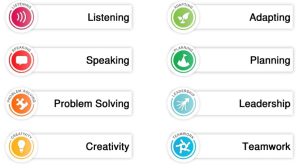
As we develop our Skills Builder Implementation Plan, our aim is to ensure that the teaching, assessment and application of these skills become a golden thread which runs throughout our curriculum.
So, whether it is through our PSHE curriculum, RE curriculum, P4C lessons, after school clubs, trips and experience days, we ensure that our children develop the skills they need to thrive, succeed and to become the very best they can be.
We partner with a number of providers to help develop our careers work, through our annual Aspirations Week, our LBBD Sustainability links, Primary Futures and the Greater London Authority Careers Programme. Our 11b411 Promises and sporting activities further enhance our personal development offer, and we are always looking for new things to get involved in!
This year for our Aspirations week we had visits from an EasyJet Pilot, Police Dog Handlers, a former Team GB Fencing Expert and an employee from the Department of Transport who came in to tell us about the many varied roles available if you work hard in the Civil Service. We had no idea there were so many roles in the Civil Service! In the coming months we are hoping to partner with Defra (Department for Environment, Food and Rural Affairs) to help extend our work on Green Careers and Sustainability.
Coming soon! Aviation Day at DBJA!
 Personal Social Health Education, Relationships & Sex Education and Philosophy for Children at DBJA
Personal Social Health Education, Relationships & Sex Education and Philosophy for Children at DBJA
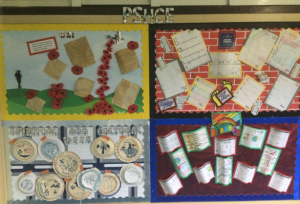
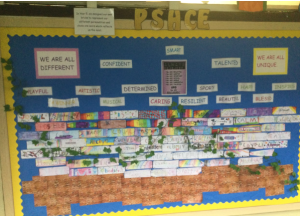
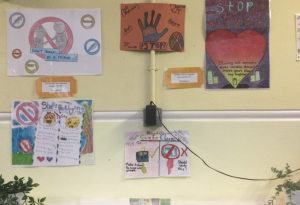
PSHE and RSE Intent |
||||
| At DBJA, we want our children to be healthy, safe and respectful. We want all children to be able to form positive relationships with themselves and their community and to make their own decisions. |
At Dorothy Barley Junior Academy, children have a weekly PSHE lesson, which follows a medium-term plan that meets all objectives. The children also participate in a half termly P4C lesson which allows them to develop into effective, critical and creative thinkers and to take responsibility for their own learning in a caring and collaborative environment. They also participate in half termly Votes 4 Schools lessons to encourage them to consider a change of topics, debate their opinion and in a democratic way complete a class vote.
We also celebrate PSHE with a range of themed weeks, themed days and assemblies including Anti-Bullying Week, Mental Health Week and Aspirations Week.
PSHE Roadmap*
PSHE Roadmap*
*Please note that the order of the units may change in certain year groups to meet the needs of the school and pupils
PSHE Overview
PSHE overview
PSHE Vocabulary Mats
PSHE Vocabulary
Learning Values
Our Learning Values are TRRAKS:
Trust
Respect
Resilience
Acceptance
Kindness
Self-Worth
Anti-Bullying Week:
The theme for Anti-Bullying this year was ‘One Kind World’. Children completed a range of activities such as designing a pair of odd socks, designing a person with a kind message and discussing the cause and effect of bullying. We also celebrated this with an assembly and completed a poster competition. The winning entry poster and the runner-up entries were carefully designed and had a clear message.
Information for parents:
November 2022:
The results to the PHSE Parent Questionnaire were as follows (blue= very important, orange = important, green = not sure and red = not important):
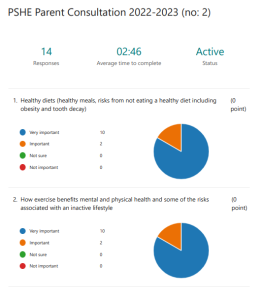
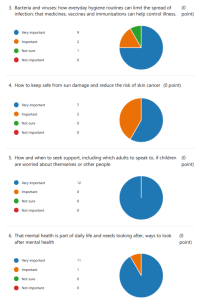
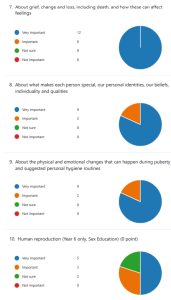
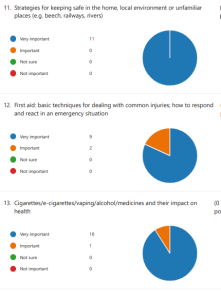
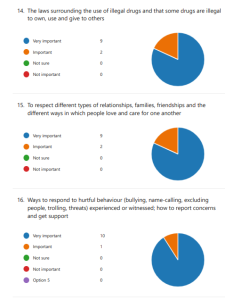
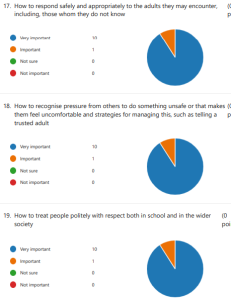
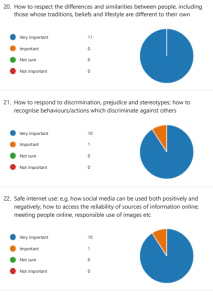
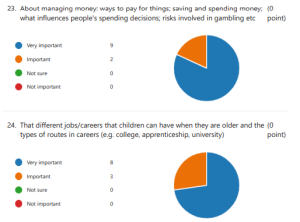
All parents thought that all areas of the curriculum were very important or important. The two questions that had the responses ‘not sure’ were catered for in our parent Open Morning that covered the following:
- To give a brief overview of our statutory duties
- To give an overview of why and how we deliver our Relationships and Health Education lessons and how they sit within our wider PSHE Education (Personal, Social, Health and Economic) curriculum
- To look at coverage and ask questions
For a copy of the full presentation please see below:
At DBJA we are a proud to be a P4C (Philosophy for Children) school!
At DBJA, through our personal development curriculum, we encourage our children to be strong and independent critical thinkers who are emotionally literate. Philosophy 4 Children is one of the key approaches we take to ensure we are a ‘thinking school’. By teaching P4C (Philosophy for Children) at our school, children are encouraged to develop and express their own opinions by using the 4Cs Thinking Model which focuses on Critical, Caring, Creative and Collaborative thinking skills. We want all of our children to be able to develop and express their own opinions about the world around them, ask questions and have meaningful discussions.
In our lessons, pupils discuss ‘big concepts’ which include our Learning Values. These lessons give them the opportunity to formulate their own questions and have discussions with their peers about how these values and concepts impact their understanding of our school community and the wider world. Through these discussions, our children can share their opinions with confidence, articulate their thoughts and respond respectfully to the opinions of others.
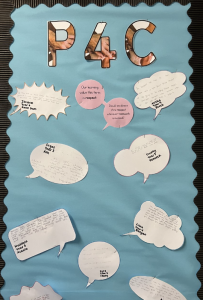
Although at the moment we teach P4C at the beginning of every half-term, P4C skills can be linked to all subjects across our curriculum. So far we have had some wonderful discussions in subjects such as Geography, History, RE and Maths lessons, and we are looking at ways to embed the principles of P4C across our whole curriculum.
